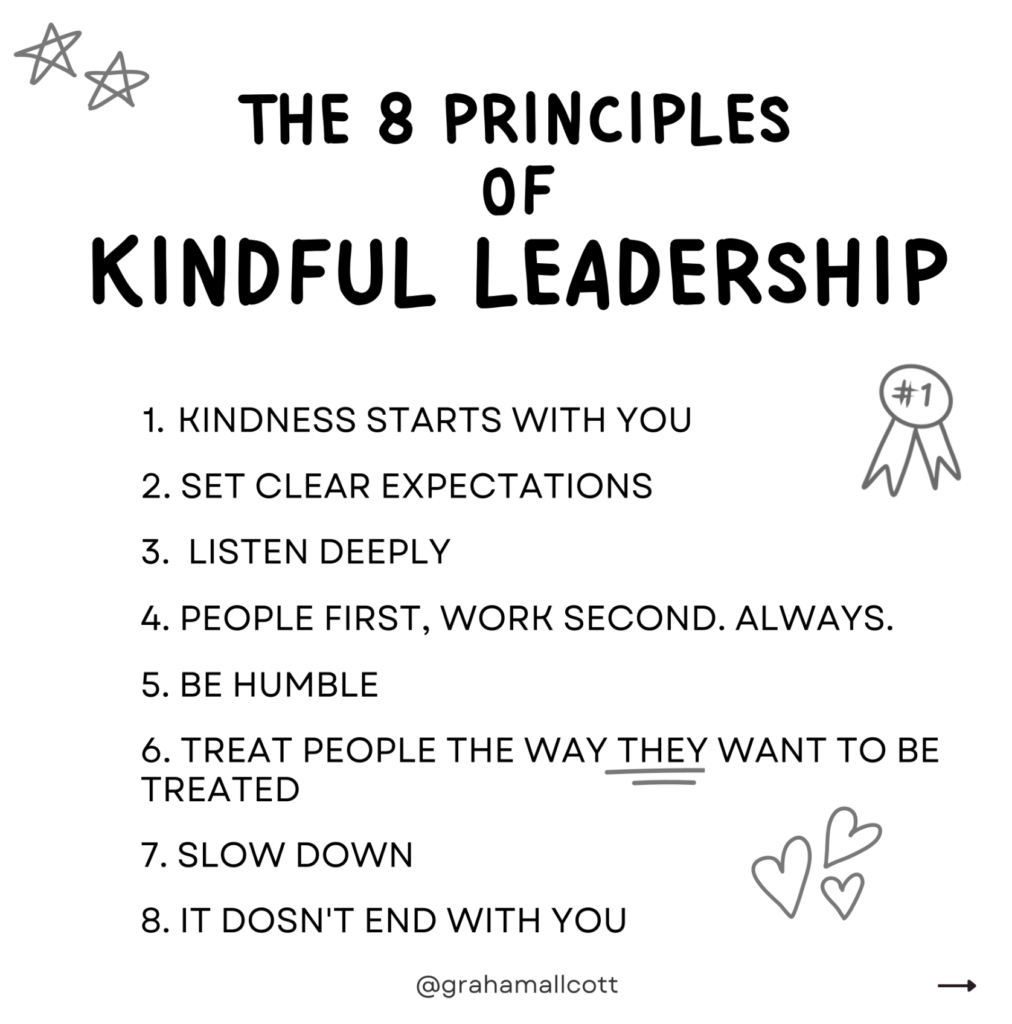I’m noticing that leaders are realising the profound impact of incorporating kindness and compassion into their leadership styles, and Graham Alcott’s eight principles of kindful leadership offer a comprehensive guide for leaders seeking to infuse their organisations with compassion, empathy, and personal growth. These strategies offer leaders a roadmap from which to create a workplace where individuals thrive, collaboration flourishes, and everyone feels valued, ultimately leading to a happier, more engaged, and successful team.
Graham’s post on Kindful leadership is here, but I’ve summarised the ‘8 principles’ below too.

Some thoughts based on the above:
- Cultivating self-compassion: Kindful leaders understand that self-care is essential for effective leadership. By practicing self-compassion, leaders can reduce stress, build resilience, and model a healthy work-life balance for their team members.
- Encouraging open communication: Transparent and empathetic communication is a cornerstone of kindful leadership. By actively listening, valuing diverse perspectives, and providing constructive feedback, leaders create an atmosphere of trust and collaboration, promoting innovation and creativity.
- Nurturing psychological safety: Kindful leaders prioritize creating a psychologically safe environment where team members feel comfortable expressing their ideas, concerns, and mistakes without fear of judgment or reprisal. This fosters a culture of learning, growth, and mutual support.
- Practicing empathy: Empathy lies at the heart of kindful leadership. Leaders who can understand and connect with their team members’ emotions, challenges, and experiences foster a sense of belonging and compassion within the organization.
- Promoting work-life integration: Kindful leaders recognize that work and personal life are interconnected. By encouraging work-life integration rather than striving for an elusive work-life balance, leaders help their team members lead fulfilling and meaningful lives both inside and outside of work.
- Supporting personal growth: Kindful leaders invest in their team members’ personal and professional development. By providing mentorship, coaching, and opportunities for growth, leaders empower individuals to reach their full potential, leading to increased job satisfaction and engagement.
- Practicing gratitude and recognition: Expressing genuine appreciation and recognition for team members’ contributions is vital for fostering a positive and supportive workplace culture. Kindful leaders take the time to acknowledge and celebrate the achievements of their team, reinforcing a sense of value and motivation.
- Leading with integrity: Kindful leaders lead by example, demonstrating ethical behavior, and upholding high moral standards. By acting with integrity and treating others with respect and fairness, leaders inspire trust and create an environment conducive to collaboration and cooperation.
- Implementing these eight strategies can have a transformative impact on leaders, their teams, and the organization as a whole. By embracing kindful leadership, organizations can create a workplace culture that values compassion, empathy, and personal growth. This not only enhances employee well-being and job satisfaction but also contributes to increased productivity, innovation, and long-term success.
A great reminder that kindness is infectious and the power it has to transform teams and the world.
Andy.